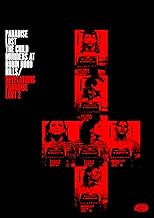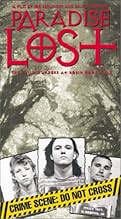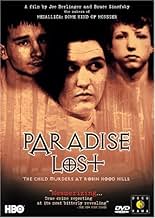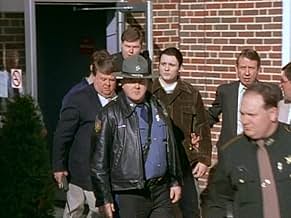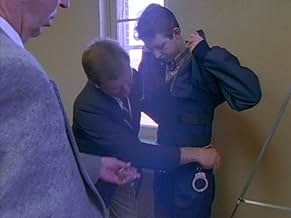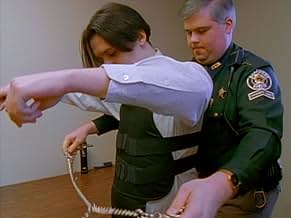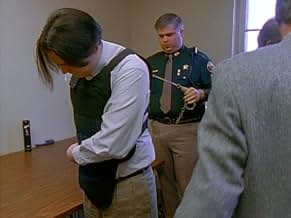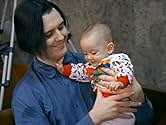Das verlorene Paradies - Die Kindermorde in Robin Hood Hills
Ein grausamer dreifacher Kindermord führt zu einer Anklage und einem Prozess gegen drei nonkonformistische Jungen, der auf fragwürdigen Beweisen beruht.Ein grausamer dreifacher Kindermord führt zu einer Anklage und einem Prozess gegen drei nonkonformistische Jungen, der auf fragwürdigen Beweisen beruht.Ein grausamer dreifacher Kindermord führt zu einer Anklage und einem Prozess gegen drei nonkonformistische Jungen, der auf fragwürdigen Beweisen beruht.
- 1 Primetime Emmy gewonnen
- 9 Gewinne & 10 Nominierungen insgesamt
- Self - KAIT-TV
- (Archivfilmmaterial)
- Self - KAIT-TV
- (Archivfilmmaterial)
- Self - KAIT-TV
- (Archivfilmmaterial)
- Self - KAIT-TV
- (Archivfilmmaterial)
- Self - KAIT-TV
- (Archivfilmmaterial)
- Self
- (as Rev. Tommy Stacy)
- Self
- (as Jessie Miskelly)
Empfohlene Bewertungen
The film's strengths are that it doesn't preach, at least not in an overly wrought narrative, and it contains intimate moments with the accused and their families as well as the families of the victims. Being a victim of a violent crime to something of this degree I understand the pain and confusion of the victim's families. What is hard to understand is the bloodlust and need for revenge and retribution that immediately takes hold of them. The victims' families are the most terrifying aspect of this film. At one point the mother of the Byrnes child says in a hateful and spiteful tone "I hate them... I hate them and the mother's that bore them."
Is there anything wrong with being hellishly angry with someone who has butchered your child? No, quite natural really. But the point of this film is that judgment was passed on these kids long before the trial even started. I imagine the Bible belt is a very scary place to be raised in... I'll have to ask Brad Pitt what he thinks about it some time.
On the issue of the prosecution. They had next to nothing. A very questionable confession from a terrified kid, Jessie, with a 72 IQ, hearsay from a couple of kids who claim they heard Damien bragging about the murder but have no proof, a knife found behind Damien's house which doesn't match the wounds on the bodies, and the assertion that because Damien read about Wicca, he must be a Satanist.
To look at the three kids is also an interesting aspect of the film. Jessie, a very small and slow kid seems a bit lost in the world. His IQ is low but he has no previous records of any type of behavior that would associate him with murder. Jason speaks in short breathless words and seems also to suffer from a low IQ. Damien is the key to everything in this film though. The defense made the key mistake of letting Damien take the stand for two reasons. The first reason is that Damien appears to have ADD and after the first 10 minutes of questioning he sort of fades away and answers in bland yes and no's. The second reason, and the most important, is that Damien is obviously extremely bright. Normally this wouldn't seem to be a problem but judging from every single person the filmmakers put on camera, smart people are hard to come by in that area of the world. Damien scared them.
All of this adds up to the fact that there was not enough evidence to put these kids away and there were other, more sinister and shocking, suspects that needed to be pursued. The war rages on for the West Memphis Three and it is indeed frightening to think that they did it, and terrifying to think they didn't.
When three very young boys are found brutally murdered, and mutilated the town of West Memphis demands retribution and closure, and so, after some fruitless weeks of police work, the suspects become three teen-age boys, who listened to heavy metal, and the oldest of whom dressed (somewhat) Goth and was interested in Wicca. A strong indictment of how, at least some of the time in our justice system 'guilty until proved innocent' is the rule.
That said, the film makes some serious miss-steps by not being clearer about some of the evidence it brings up, but never explores. For example, we're told early on by the filmmakers that all 3 boys had alibis for the night of the killing, yet we never hear about it again. Are their defense lawyers THAT bad, or were the alibis not solid? Two said they were home with their families, yet the families never mention being with them that night. Similarly, we are never told why the police picked up the first of the boys, a borderline mentally retarded kid, who clearly didn't know what was going on, for questioning. The implication was that the cops wanted an easy pliable target, but the issue is never explored either by the defense, or by the film-makers. In a 150 minute movie, there's no need for those kind of loose ends, leaving us to question whether we've seen a fair reporting of what went on, or if there really was more evidence against the kids than we're shown.
Still a powerful and important examination of how we often rush to judgment, socially and legally. Recent history has shown this is far from an isolated case - people are sent to prison, even death row on flimsy or incomplete evidence, and by playing on a juries fears far more often then we would all like to believe.
It seems so utterly implausible that a jury could have convicted any of the suspects that I wonder what the filmmakers did not show us. Specifically, I wonder about the fiber evidence, which was the only real physical evidence at all.
I could only rate this documentary a 7 out of 10 because of the unasked questions and the evidence we were not shown. I would like to have come away from watching Paradise Lost with a clearer understanding of what those jurors heard and saw that led them to their verdicts. Mind you, I don't think those boys did it -- I think that even fiber evidence could have been too flimsy to convict them. But I wish I had been left convinced.
Wusstest du schon
- WissenswertesFirst feature film to contain licensed music of Metallica, something that the band was initially opposed of doing. The band was involved in raising public awareness of the accused. Joe Berlinger would later do a documentary on Metallica in "Metallica: Some Kind of Monster".
- PatzerDamien reads this Shakespearean quote while on trial: "Life's but a walking shadow...full of sound and fury signifying nothing." He incorrectly refers to it as being from A Midsummer Night's Dream. It is, in fact, a soliloquy famously from Macbeth.
- Zitate
Damien Wayne Echols: I knew from when I was real small people were gonna know who I was, I always had that feeling... I just never knew how they were gonna learn. I kind of enjoy it now because even after I die, people are gonna remember me forever. People are gonna talk about me for years. People in West Memphis will tell their kids stories... It'll be sorta like I'm the West Memphis boogie man. Little kids will be looking under their beds - "Damien might be under there!"
- SoundtracksWelcome Home (Sanitarium)
By Metallica
Written by James Hetfield, Lars Ulrich, and Kirk Hammett
Produced by Flemming Rasmussen (uncredited) with Metallica (uncredited)
Top-Auswahl
Details
- Erscheinungsdatum
- Herkunftsland
- Offizieller Standort
- Sprache
- Auch bekannt als
- America Undercover: Paradise Lost - The Child Murders at Robin Hood Woods
- Drehorte
- Produktionsfirmen
- Weitere beteiligte Unternehmen bei IMDbPro anzeigen


